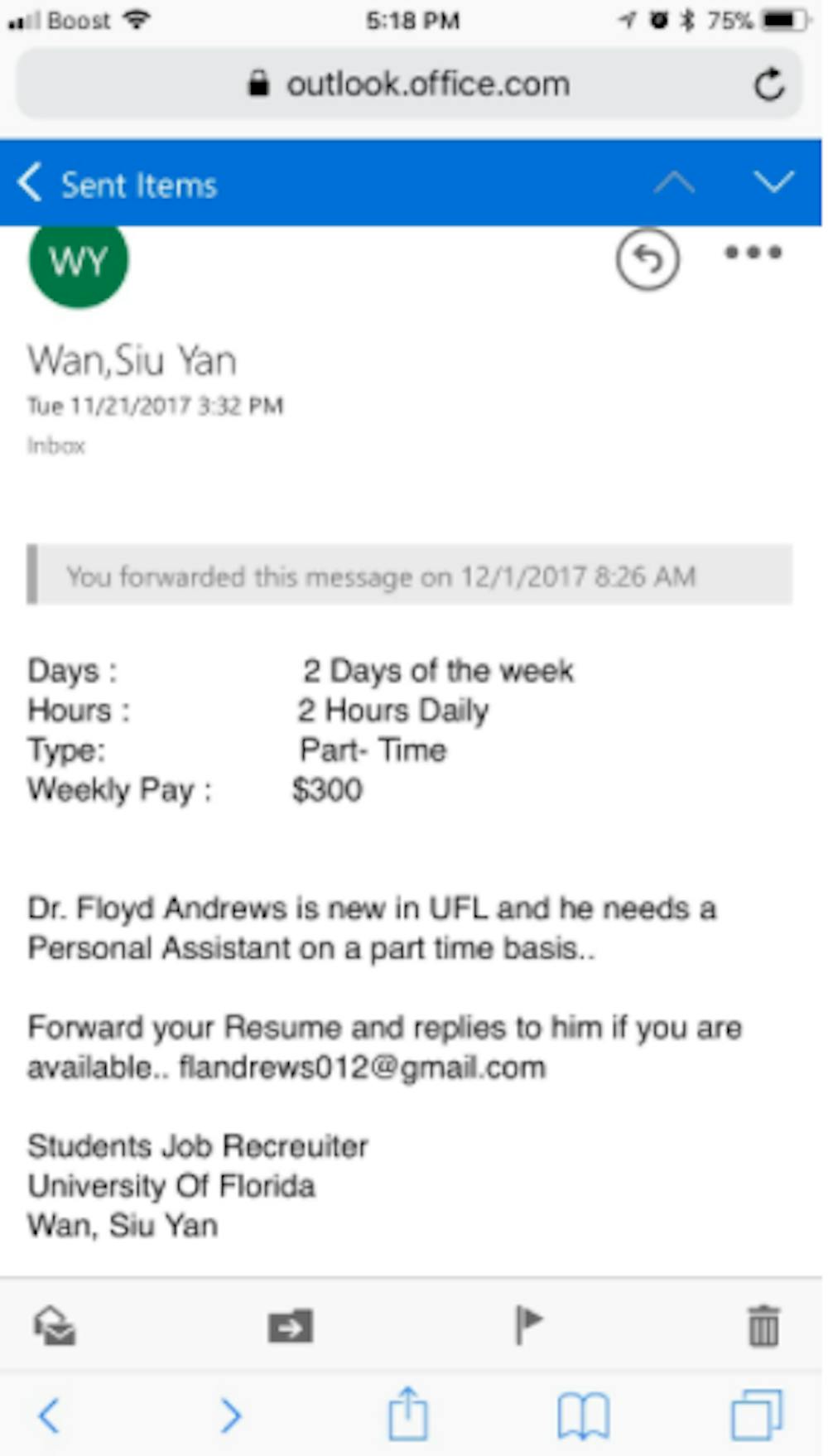Jessica Socorro didn’t expect to lose $1,610 when she answered an email from a ufl.edu address offering a job.
The UF digital arts and sciences graduate student got the email on Nov. 21 advertising a part-time personal assistant position for “Dr. Floyd Andrews.” The email didn’t list his position or college and included a misspelled word.
Paying for her own education, rent and car insurance as a first generation college student, Socorro knew landing this job would provide financial relief.
“$300 per week was gold in my eyes,” Socorro said.
She applied and heard she got the position four days later. She was then instructed to buy iTunes gift cards the incoming professor said he would use to buy required office supplies, and she was told she would be reimbursed the following day. By this time, Socorro and Dr. Floyd were communicating over text.
“Scratch (the gift cards)... and send the pictures via email and get back to me,” Floyd said in a text.
Socorro said she assumed the gift cards would be used to buy various Apple products, or “important gadgets,” as Floyd called them.
“I thought he had his own methodologies of doing things,” she said. “So I didn’t want to mess with that.”
Socorro purchased the iTunes gift cards at both Best Buy and Walmart in Gainesville for $1,610 total. By the time Socorro realized Dr. Floyd’s reimbursement payments were not coming, the majority of the iTunes credit was spent and Floyd was unreachable. She never heard from him again.
“It was very traumatic,” she said.
Socorro said she filed police reports with Gainesville Police Department and University Police, and alerted UF Information Technology about the email scam.
Police said Socorro’s case is not unique. Officer Ben Tobias, a GPD spokesperson, said his department gets two to three such reports per week, received by a full squad of detectives who deal solely with financial fraud cases.
“It’s quite a big threat,” he said.
Most financial email scams originate overseas, making it increasingly difficult for law enforcement to pursue traditional arrest and prosecution.
“That money is almost never recovered,” Tobias said.
He said UF’s capacity to deal with these scams on the front end is not lacking.
“People are being asked to get iTunes gift cards or prepaid credit cards,” he said. “That should strike a red flag for absolutely anyone.”
In an email to the Alligator, UFIT staff wrote they planned on contacting Socorro about her case.
“(We) always address the threat first as time is of the essence depending on the severity of the report,” staff said.
The staff said it blocked close to six billion — 5,907,846,215 — harmful emails in 2016. But not all cyber threats get caught prematurely.
For cases that aren’t immediately blocked from the UF network, such as Socorro’s, UFIT relies on reports from victims.
“The biggest challenge is effectively addressing UF community members’ natural tendency to trust,” UFIT said.
Typically, UFIT will post to its alerts webpage, alerts.it.ufl.edu, or send email notifications about threats to IT staff members. Socorro said this notification system regarding scams is insufficient.
She said not all of the campus population is guaranteed an alert message, and students who aren’t from the U.S. require more detailed information.
“Don’t just tell us that these scams are out there, describe them,” Socorro said.
Socorro said she had to take things in her own hands and contacted the companies she lost money to. Best Buy and iTunes reimbursed her for $810 of the money spent.
“I was lucky in my situation, not everyone can get this lucky,” she said.
Contact Elliott Nasby at enasby@alligator.org. Follow him on Twitter at @_ElohEl.
Jessica Socorro, a UF digital arts and sciences graduate student, received an email from a ufl.edu address on Nov. 21 advertising a part-time personal assistant position for “Dr. Floyd Andrews.” The email didn’t list his position or college and included a misspelled word.





![Photo of the missing Leachianus “Leachie” gecko. [Photo courtesy of Mike Southwick]](https://snworksceo.imgix.net/ufa/907bd92a-0b29-40eb-a5fb-d7db7cf98b2f.sized-1000x1000.jpg?w=1500&ar=16%3A9&fit=crop&crop=faces&facepad=3&auto=format)
